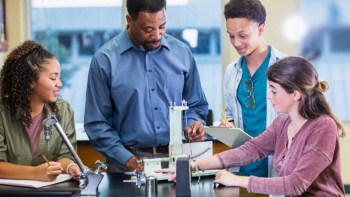On 7 June the electorate in the UK will go to the polls to elect a government that will run the country for a period of up to five years. Science rarely figures in election campaigns in any meaningful way, although this time round representatives of the scientific community are making valiant efforts to engage in the election process. However, education always features strongly, and right now education at all levels is the single biggest challenge facing the science community in the UK.
The real show-stopper for science is a shortage of school teachers in general, and a chronic shortage of science teachers in particular, that threatens the economic prosperity of the country in a knowledge-based world. The new government has it in its power to increase salaries for teachers and, at the same time, reduce the administrative burdens that have had such a demotivating effect on the profession.
Attempts to increase the number of young people going to university are also being hampered by the fact that most students now graduate with debts that run into thousands of pounds. At the last election in 1997 all the major parties were vague about their higher-education policies because the Dearing committee – which was conducting the biggest review of higher education in 30 years – had not then produced its final report. However, the Labour government effectively ignored most of Dearing’s recommendations on student finance to produce a botch job – replacing grants with loans and introducing limited fees – that has pleased no one. Some form of graduate tax is surely the way forward, but it is difficult to imagine any of the parties having the vision or the guts to float such an idea.
What about academics? Their salaries are not competitive in international terms, which means that UK universities can no longer attract the brightest talents, although moves have recently been made to address this problem. However, Labour has allowed too many onerous reviews of the universities, such as the Quality Assurance Agency’s reviews of teaching quality and the “transparency” review of money spent on teaching and research.
However, the Labour government must be given credit for its willingness to invest new money in the science base. The fact that British astronomers are currently negotiating to join the European Southern Observatory is a refreshing change from the early 1990s when the Conservative government of the time seemed intent on pulling out of as many European ventures as possible. It is essential that this enlightened and far-sighted approach continues, and that the next government also does what it can to encourage British industry to invest in R&D at the same levels as its competitors.
Thomas Young lives on
Some 200 years ago a young polymath and qualified medical doctor called Thomas Young turned his attention to light. Young had already made several medical breakthroughs – he discovered the cause of astigmatism, for instance, but his medical career was unsuccessful because he lacked a suave bedside manner – when he became the first physicist to demonstrate that light is a wave. Not surprisingly, Young’s famous double-slit interference experiment was initially met with hostility because the wave theory of light ran counter to Newton’s corpuscular theory. Now, of course, we know that both were right.
Young went on to make many other discoveries in optics, elasticity and other areas of physics – not to mention helping to decipher the Rosetta stone – and, as this month’s feature on quantum carpets illustrates, the subject of interference continues to fascinate physicists 200 years later.



